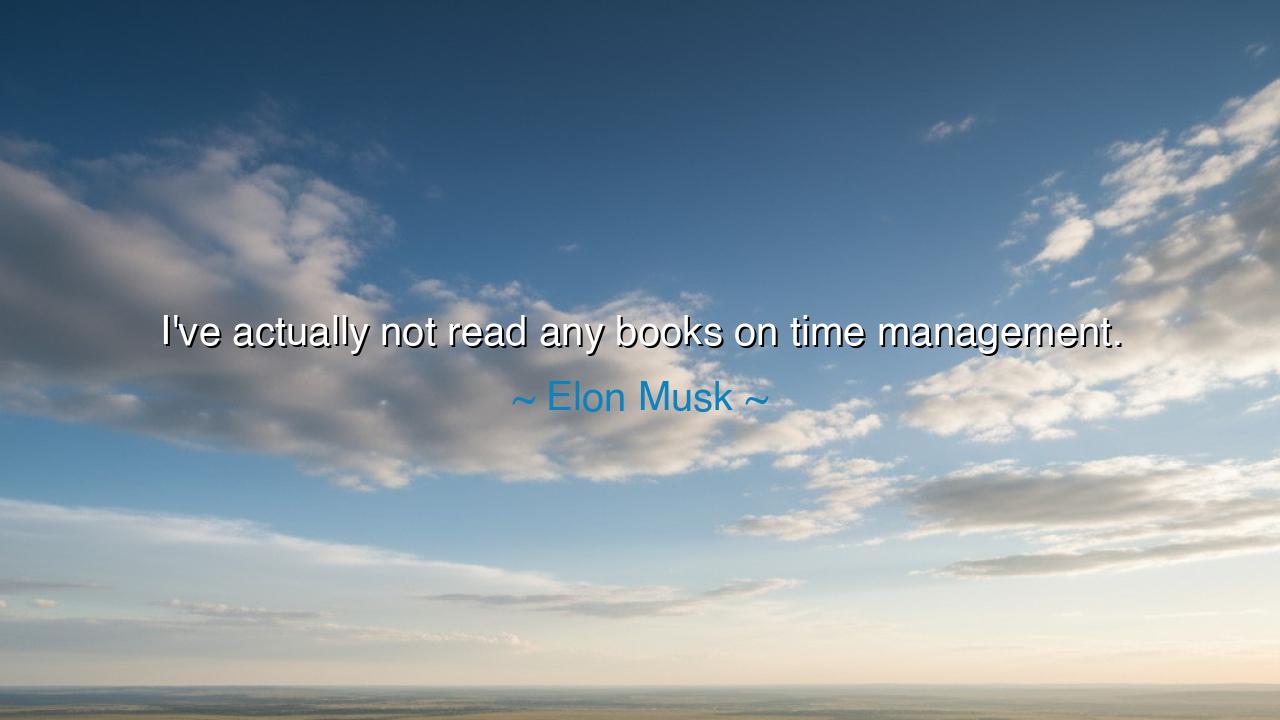
I've actually not read any books on time management.






The words of Elon Musk, “I’ve actually not read any books on time management,” may sound casual at first, yet they carry within them the fire of a deeper truth. They reveal the paradox of great achievers: that mastery of time is not found in manuals or theories, but in the crucible of lived purpose. Musk, a man who builds rockets to the heavens and cars that reshape the earth, confesses that his understanding of time did not come from others’ prescriptions, but from the relentless pursuit of his own vision. His quote is not arrogance, but testimony—that time management is not about following steps, but about bending one’s days around what matters most.
The origin of these words lies in Musk’s many interviews, when asked how he manages to command companies that span multiple industries—Tesla, SpaceX, Neuralink, and more. The question often comes from awe, for his life seems an impossible puzzle of hours. Yet his answer strips away the mystery: he does not rely on the written wisdom of others, but on the burning compass of his own will. In this way, Musk echoes the ancient truth that greatness is not built by rote imitation, but by forging one’s own path.
The ancients themselves would have understood this. Did Alexander the Great read books on empire before setting forth to conquer the known world? Did Leonardo da Vinci consult manuals on creativity before painting the Mona Lisa and designing flying machines? No—like Musk, they were seized by vision, and their time bent to serve that vision. Their days were not divided by formulas, but consumed by devotion. For the soul that knows its purpose does not need to be told how to use its hours; every breath naturally flows toward the work.
History offers us the luminous example of Thomas Edison. He, too, kept no book of rules for time, but worked with feverish intensity, often sleeping little, driven by the conviction that each moment must serve invention. While others might have sought to balance or schedule, Edison threw himself fully into his craft, producing the phonograph, the light bulb, and countless other wonders. Like Musk, his mastery of time came not from reading about it, but from living as though every hour were a spark to be captured before it vanished.
The meaning of Musk’s words, then, is not that books are useless, but that no external guide can replace the inner fire. Time management, in its truest form, is not about calendars and lists, but about alignment—the union of one’s days with one’s deepest mission. A man with no vision will waste even a perfectly planned day. But a man with vision will carve miracles out of chaos. Musk’s casual remark carries this wisdom: what matters is not how you schedule time, but how you devote it to what you believe.
The lesson is this: do not wait until you have mastered techniques to begin. Do not imagine that the perfect system will unlock your life. Instead, find your purpose, and let that purpose discipline you. For the one who knows why he rises in the morning will not squander his hours. Purpose itself is the greatest teacher of time.
Practical action lies close at hand. Seek not first for books of rules, but for clarity of heart. Ask yourself what is worthy of your life, and then shape your time around it. Let distractions fall away, not because a book tells you to, but because they no longer serve the fire within you. Work with intensity when the vision demands it, rest when renewal is needed, but above all, let no hour drift without meaning.
Thus, in the voice of the ancients, we proclaim: Blessed are those who live by vision, for their time shall bear fruit beyond measure. Blessed are those who devote their days to what is worthy, for they will need no manual to govern their hours. And let us remember the wisdom of Elon Musk: that true time management is not read, but lived—born from purpose, forged in work, and sustained by the fire of a dream.






AAdministratorAdministrator
Welcome, honored guests. Please leave a comment, we will respond soon